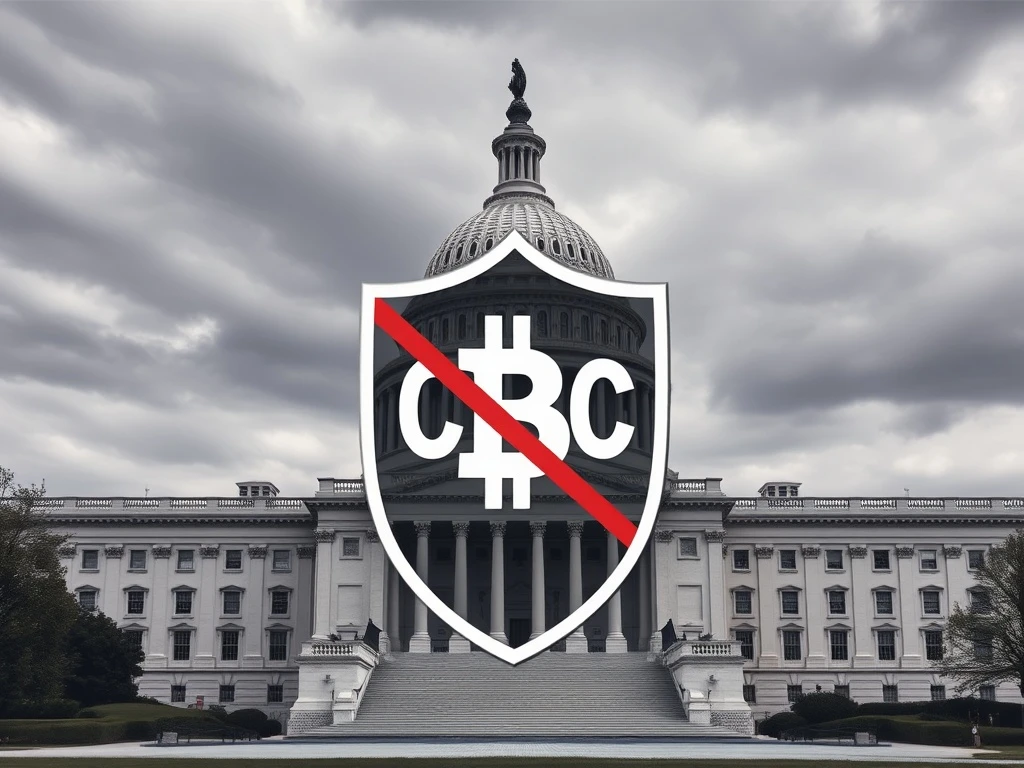Landmark CBDC Ban: US House Stalls Federal Reserve Digital Currency Plans in Defense Bill

A significant development has emerged from the United States Capitol. The US House of Representatives recently added a **CBDC ban** provision to a sweeping defense policy bill. This move could profoundly impact the future of digital finance in America. Specifically, it seeks to prevent the Federal Reserve from issuing its own digital currency. This legislative action highlights ongoing debates surrounding government control, financial privacy, and the role of digital assets. Many in the crypto community are closely watching these developments. They understand the potential implications for the broader landscape of **crypto regulation**.
The Crucial CBDC Ban in the House Bill
The US House of Representatives has inserted a critical provision into a massive defense policy bill. This addition explicitly prohibits the Federal Reserve from creating a central bank digital currency (CBDC). The language appeared within a nearly 1,300-page document. This bill outlines the country’s defense policy for the 2026 fiscal year. This action marks a decisive step against a potential government-backed digital dollar. Lawmakers are clearly taking a firm stance on this complex issue.
Specifically, the revision of HR 3838, the House’s version of the National Defense Authorization Act, included this sweeping language. The House Rules Committee shared this update on Thursday. The provision aims to stop the Federal Reserve from even studying or developing a digital currency. This indicates a strong desire to prevent any such initiative from moving forward. For many, this represents a victory for financial privacy advocates.
Understanding the National Defense Authorization Act’s Role
The National Defense Authorization Act (NDAA) is a vital piece of legislation. Congress considers it a “must-pass” national security bill. It outlines how the military receives funding and how it spends its budget. Consequently, lawmakers often attach non-defense-related provisions to it. These additions might otherwise face significant delays or revisions as standalone bills. This strategy ensures their passage. Therefore, including the **CBDC ban** in this bill gives it a much stronger chance of becoming law. It bypasses many potential roadblocks.
The NDAA’s importance means that amendments often carry considerable weight. Attaching the **CBDC ban** to such a critical bill reflects a strategic legislative maneuver. This approach highlights the urgency some representatives feel regarding a **Federal Reserve digital currency**. They view it as a significant policy concern. Furthermore, this method avoids the uncertain fate of separate legislation. This is especially true for controversial topics like digital currency issuance.
Political Maneuvering Behind the Federal Reserve Digital Currency Block
Top House Republicans had previously promised to include a **CBDC ban** in the military spending bill. This promise came as part of a deal with conservative hardliners in July. A group of Republican holdouts initially refused to advance three crypto bills. They demanded a guaranteed CBDC ban. This stalled a vote to set up floor debate for over nine hours. This marked the longest such delay in House history. The intense negotiation demonstrated the high stakes involved.
At that time, the standalone passage of a CBDC-banning bill seemed unlikely. It lacked broad support. However, debate on the bills eventually moved forward. House Majority Leader Steve Scalise confirmed the **CBDC ban** would be added to the National Defense Authorization Act. This concession satisfied the dissenting Republicans. Ultimately, the House did pass the standalone CBDC ban bill by a thin margin. Its future in the Senate, however, remains uncertain. This political strategy underscores the strong opposition to a **Federal Reserve digital currency** within certain factions.
Key Provisions of the Proposed Crypto Regulation
The provision within the defense policy bill directly targets the Federal Reserve. It aims to ban the Fed from issuing any digital currency or asset. Moreover, it prevents the central bank from offering financial products or services directly to individuals. This ensures that the Fed cannot bypass commercial banks. The measure also explicitly states that the central bank may not “test, study, develop, create, or implement” a digital currency or asset. This broad language covers all stages of development.
Significantly, the bill includes a specific carve-out for stablecoins. It states that the prohibition does not apply to “any dollar-denominated currency that is open, permissionless, and private.” This distinction is crucial. It suggests a willingness to allow private sector innovation in digital dollars. However, it restricts government-issued versions. This nuanced approach reflects a desire to shape **crypto regulation** carefully. It aims to balance innovation with concerns over government overreach.
Previous Attempts and the Path Ahead for the CBDC Ban
House Republicans have consistently sought to ban CBDCs. They pursued a version of the CBDC-banning bill in the last Congressional session. Representative Tom Emmer introduced the similarly named CBDC Anti-Surveillance State Act in early 2023. However, that bill did not progress. It ultimately died with the last Congress. This history shows a sustained effort by certain lawmakers.
Emmer reintroduced a version of the bill in the current Congress. Republicans have largely supported this effort. They view it as aligning with President Donald Trump’s executive order from January. That order also prohibited CBDCs. The current inclusion in the NDAA represents the most significant push yet. While the House has acted, the bill must still pass the Senate. Its journey through the legislative process is far from over. The ongoing debate highlights fundamental questions about privacy, financial control, and the future of money in the digital age. Ultimately, the outcome will shape the landscape of **crypto regulation** for years to come.







